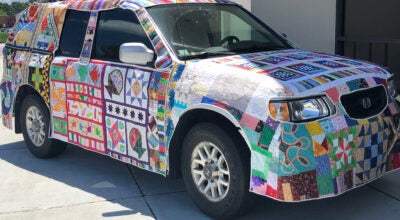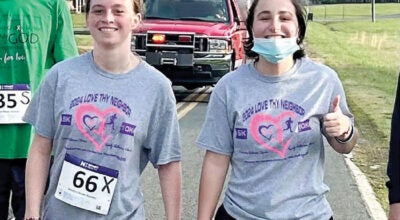Perfect match: Statesville siblings participate in paired kidney donation
Published 12:00 am Friday, July 25, 2008
By Susan Shinn
sshinn@salisburypost.com
STATESVILLE ó Ryan Cress and his sister Elizabeth have a lot in common.
They both have striking blue eyes and dark hair. They share an easy camaraderie. And they each have a crescent-shaped scar running along their right sides.
In March 2006, Ryan, now 27, was diagnosed with kidney failure. He started dialysis two months later, and that summer was put on the transplant list.
“It was just assumed I would give him a kidney,” says Elizabeth, 23, his only sibling.
But their blood types were incompatible, and Ryan remained on peritoneal dialysis for two years, the machine cleaning the toxins from his body as he slept.
In March of this year, Elizabeth was approached by the transplant coordinator at Carolinas Medical Center about a paired kidney donation.
Would she be interested?
Her answer was yes.
nnn
Since 2004, the Paired Donation Network has matched couples ó one of whom needs a kidney, one who is willing to donate a kidney ó with other couples in the same situation.
There are currently 190 pairs in the network ó the more the better, says Teresa Braun, its executive director.
Ryan and Elizabeth were told they were a match for a another couple in the area.
Elizabeth and her mother, Paula, met with the transplant surgeon to get more information. Tim Cress, a real estate appraiser, is Paula’s husband. He grew up in China Grove, and Ryan and Elizabeth are the grandchildren of Sue Cress, who still lives there.
Elizabeth and her mother discovered that all four surgeries would take place simultaneously at CMC.
That made Paula happy.
“I didn’t want my children in surgery in different places,” she says.
nnn
In the meantime, Ryan was continuing with his dialysis.
He was able to take treatment at home in the evenings, so he could still work during the day.
He worked with his uncle, Steve
Yates, at Yates and Funderburk Concrete Finishing in China Grove.
“That way, I was able to live more of a normal life,” he says.
Dialysis still sounds like a drag.
“It pretty much is,” Ryan says.
He had symptoms for about a month and a half before his diagnosis.
“I had excruciating headaches and regular nosebleeds,” he says. “My vision got blurry and I felt really bad. Finally, one day at work, I called my mom and asked her to take me to the emergency room.”
His bloodwork revealed that his kidneys were damaged.
Soon after he went on dialysis, his doctor told him during a visit, “Yeah, you’ve got to have a kidney transplant.”
Ryan was floored.
“I thought, surely this isn’t really happening,” he says.
“He’d always been very healthy,” Paula says.
“Very healthy.”
nnn
Elizabeth has always been healthy, too. Just after her brother’s diagnosis, she left for Greenville to continue nursing school at East Carolina University.
She admits it was nice to be away from home ó to be able to focus on school.
She was disappointed when she learned she couldn’t give Ryan a kidney.
“But on the other hand, I could help two families at the same time,” Elizabeth says.
“The way I look at it, Elizabeth did give me a kidney,” her brother says. “It’s because of her that I got one.”
nnn
Elizabeth had some concerns. She worried that her remaining kidney would not compensate. But doctors assured her that it would. There would be no longterm effects. When she planned to have children, she was told she’d be watched closely, but that she’d have a normal pregnancy.
“They assured me everything would be fine,” she says. “In the back of my mind, I knew that I was always going to do it.”
After all the blood tests, tissue typing and CT scan to determine exactly what her kidneys looked like, Elizabeth got the go-ahead for donation on May 16. Surgery was set for June 17.
nnn
Even though both her children would be undergoing surgery, Paula felt good about the procedure.
“For two years, I struggled with all this,” she says. “But in a few months, I had a peace about everything. Elizabeth said it was meant be.
“My faith just got me through it. When Ryan was diagnosed, I thought was I going to die, too. I was in denial, but I had time to come to grips with it.”
nnn
Before surgery, Elizabeth was understandably stressed.
On June 16, she took ó and passed ó her state boards. She was also in the process of moving to a townhouse in Winston-Salem with two fellow nursing grads. She’d accepted a job in the neonatal intensive care unit at Forsyth Medical Center, with a start date of July 14.
She had a small window of opportunity to make her donation. That’s one reason she thinks the surgery came together so quickly.
The day the hospital called with the match was two years to the day that Ryan called his mother to take him to the emergency room.
nnn
Ryan and Elizabeth were asked if they’d like to meet the other pair of patients before or after the surgery. They decided to wait until afterward.
Ryan and Elizabeth were put in the same room to await surgery. Elizabeth would go first. “We were all able to go in and be with them,” Paula says. “The mood was light and we were joking and then Elizabeth got upset and it was just like a chain reaction for our family. It was pretty intense when we said goodbye to them.”
“She came over to hug me,” Ryan says. “I told her I loved her and thank you and I’d see her when we woke up.
“And I did.”
nnn
Elizabeth had a talk with her kidney before surgery.
“Be good,” she told it.
Ryan’s donor must’ve had the same conversation. His new kidney started working as soon as he received it.
The same thing happened with the woman who received Elizabeth’s kidney.
The siblings stayed in the hospital four days and have been recovering at their parents’ home.
Elizabeth started work Thursday, having completed her orientation. Since her procedure was laparoscopic, she had a quicker recovery time. Ryan hopes to go back to work by mid-August. He’s been driving for a week or two.
“Other than the soreness, I feel really good ó better than I have in the last two years,” he says. “You just get used to feeling tired and sick. You just have to take it easy and let your body recover.”
Ryan and Elizabeth like the fact that they were part of the first paired donation procedure at CMC.
“We couldn’t have asked for a better team,” Elizabeth says.
“They’ll always remember we were the first,” Ryan says.
“We made history,” his sister adds.



